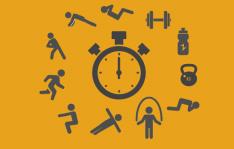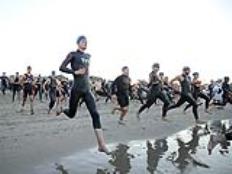5. Working on speed when focus should be on endurance and vice versa
What's the point of trying to swim, bike and/or run faster if we can't maintain these speeds during races due to a lack of muscular endurance? The question is whether we should be working on speed, speed endurance, muscular endurance, strength or a combination? An easy starting point is to know your pace regression rates. For instance, how much does your running pace slow down as the distance increases?
Perform a simple running test, like an 800-meter and 1,600-meter all out, and measure the pace regression percentage between the two. If you are near 20 percent, forget about speed work all together! Developing muscular endurance should be your primary objective.
6. Low-quality miles
This applies to all distances, but I will make this point specific to ultra-distance training. Too many times athletes focus on a number of miles (or hours), instead of quality. To be specific, if you have a 6-hour bike workout, and have to spend the first 30 minutes and the last 30 minutes of your workout going through town at a leisurely pace before getting to open roads, that hour does not count.
More: Lauren Goss Shares How To Pack For An Away Race
What about warming up you will ask? Only a short one may be necessary if you are scheduled for a tempo pace workout. Furthermore, you will want to best simulate your long-distance race conditions. Can you do it if you stop two to three times for five to 10 minutes to get some water/nutrition, or stretch your legs and back? Will you do that on race day? Make sure that your training, and especially your long workouts, mimic race day experiences as closely as possible.
7. Ignoring recovery weeks
You may not always appreciate the importance of recovery weeks and the physiological adaptations that take place during these weeks. Call them your adaptation weeks. Without adaptation weeks, your body doesn't adapt to the training load and stress put on it during training weeks. Adaptation weeks are an essential component of training, and must not be ignored.
Furthermore, adaptation weeks are not the same as rest days, or taper weeks. Each has its specific purpose and benefits. Adaptation weeks typically take place every third or fourth week within a training plan, and see a significant reduction in training volume and most of the time intensity as well. Ignore them, and you will quickly plateau, before seeing your overall fitness decline.
8. Skipping a strength training program
Many athletes tend to overlook and skip strength training all together. Even when such workouts are planned, if something has to go during a given training week, it is usually strength training. That's unfortunate as strength training represents a critical component of our overall fitness, our ability to perform well and avoid injuries. It typically includes core exercises, plyometric exercises and weights, regardless of the level of the athletes. Very rarely hour-long workouts in that domain are required. Rather, it is best to plan 20- to 45-minute workouts, especially after swim sessions, when athletes are already at their health club, have access to proper equipment and can more easily perform these strength routines.
More: Sex and Triathlon: Do They Mix?
Furthermore, 10-minute workouts that athletes perform at home, even while watching TV, can be done anytime throughout the entire season. Examples include glutes and lower-back strengthening exercises. Similar to swim, bike and run training, strength training should follow a periodization approach. Little will be gained by repeating three sets of 15 repetitions at the same weights 12 months a year. Instead, different strength training phases must be followed, with varying loads, numbers of repeats and speeds of execution.
9. Not having tangible and measurable objectives
It is important to have clear objectives and expectations. The more fact-based they are, the better. Whether you have completed your first Olympic-distance race in 3.5 hours and are now targeting a 3 hour, 10 minute finish in the next four months, or aim at achieving a sub 9 hour, 30 minute ultra-distance PR, your goals should be clearly defined. As you become more advanced, you must also know where the improvements will be coming from.
Do you need to swim faster, and by how much? Do you need to shave five more minutes off your bike split and how does this translate into a measurable wattage increase? Do you need to reduce the impact that your bike has on your running pace? Once you have defined your objectives and where fitness improvements should come from, you can then determine what training plan and structure will be required to allow you to achieve these goals and measure your progress. Then keep a long-term focus and mindset. Don't let daily, even weekly workout results, whether positive or negative, derail your long-term plan. Focus on mastering daily training execution while keeping long-term fitness achievement in perspective.
10. Movement efficiency
Maximum athletic performance can only be achieved when someone's physiological efficiency and mechanical efficiency are at their best. Neglecting movement efficiency is like adding cylinders to a poorly running engine. It will only make the problem worse. Make sure you work on your form and technique, meaning that your muscles are activating at the proper intensity, in the proper order, with the proper range of motion, to move your body in the most efficient way. Proper mechanical efficiency will make you faster, will allow you to sustain paces at lower energy expenditure levels and will help you stay injury-free. Some of the obvious actions that you can take include getting a bike fit, swim video analysis, running gait analysis, biking and running drills, plyometric exercises and strength and core exercises.
More: The Run: Not All Running Is the Same
In conclusion, these recommendations are not about training more or training longer. It is about training smarter. It is the difference between working out in a somewhat unstructured way and training in a well-planned and structured manner to reach your goals. It is about optimizing your time spent training and doing what you love doing. And it will even make it more fun!
Eric Gauthier is a USA Triathlon Level I Certified Coach and an International Triathlon Coaching Association (ITCA) coach. Eric's website is egmultisportcoaching.com and he can be contacted at egmscoach@yahoo.com.
- 2
- of
- 2









Discuss This Article